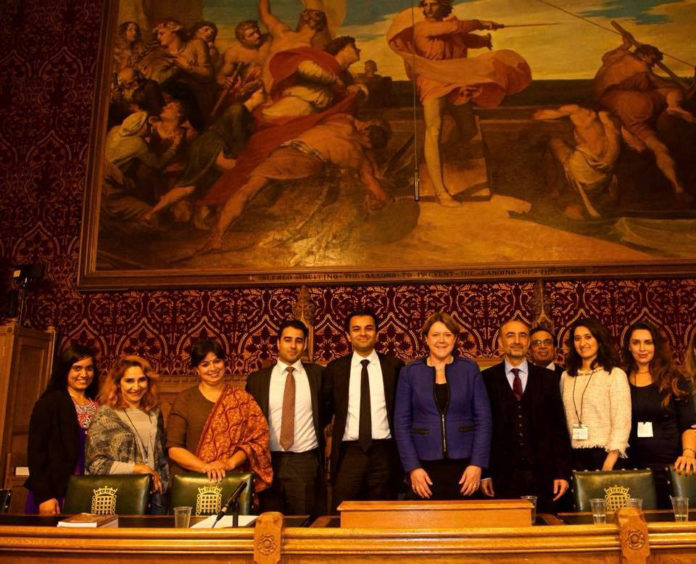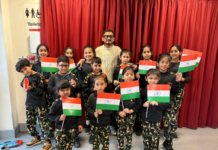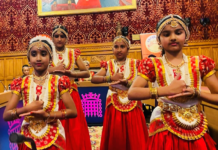On 18 November 2017 SHYAM (SATKARMA HUMANITARIAN YOUTH AWAKENING MISSION (SHYAM) speaker Sonal Sher gave an inspirational talk on Women’s Empowerment in Hinduism to over 150 Women at the Ahmadiyya Muslim Association. The talk received an incredible amount of feedback from the attendees following its explanation about how since the time of ancient India women have always been at the forefront of Indian spirituality, politics, economics, arts, society, culture and all other areas of human life. We congratulation Sonal Sher on this amazing achievement and for spreading these most important femine spiritual values that are most needed in today’s society.
Indian spirituality, religion and tradition has a balanced attitude towards the entire process of worshiping. It is the only place in the world where the Supreme Power is worshiped in the female form as Jagad Amba. We have great respect for women and we regard the Divine as our Mother.
Every village in India has its own Mother Goddess. Indian understanding of feminine energy is so deep-rooted that all Sanskrit consonants in our mantras represent the feminine aspect of Prakruti whereas the vowels represent the masculine aspect of Purusha. This feminine energy brings about certain qualities in Indians which is missing from the Western world.
From a spiritual perspective, in Hinduism we worship the following seven main divine manifestations in the feminine, which are more prominent in women than men: kirti (fame), Shree (prosperity), vāk (speech), smriti (memory), medhā (intelligence), druti (firmness) and kshama (patience). A woman who has developed these seven spiritual qualities has such a strong aura and radiance about her that men begin automatically worshipping her and begin her as Maa (mother). In Indian culture we address a woman that we respect as Mother.

If we go through each and every one of them then first of all there is kirti, which means inner beauty. There is an outside beauty to women, but at the same time there is an inner beauty to women. When women themselves live inspirational lives then this inner energy of theirs gets so developed and their inner beauty becomes so beautiful that ultimately the woman reaches such a state that men beginning addressing her as Mother. This is the level of the Mother Goddess. The woman becomes a Mother. In Truth every woman is a Mother. A woman is ultimately a mother. She is a mother first.
Psychologists say that when a man and a woman get married then the man only has an interest in becoming a husband whereas the woman has an interest in becoming a mother. And if the woman has to become a wife in order to become a mother then the woman is ready to become a wife. A man has no interest in becoming a father. A man does not get married in order to become a father. A woman gets married in order to become a mother whereas a man gets married in order to become a husband. This is the root difference between a woman and a man. A woman is ultimately a mother. When this motherliness develops to its complete excellence and blooms in its completeness then this is kirti.
In the Vedic period when the son returns having gotten married and the daughter-in-law touches the feet of the mother in law then the mother in law gives her blessings that “may you be the mother of 10 children”. Then they would say that “may your husband be your 11th child”. Fine, but this was there in those times because progeny were needed and progenies were necessary and the population was less at the time, and it needed to be increased. Therefore this happened. But it was said with hope that “may your husband be your 11th child” not to complete a cricket team but so that after the daughter-in-law has had 10 children and has developed that relationship with her husband then ultimately she should reach that state where her husband stops looking at her with the perspective of a wife but so that even her husband sees her as a Mother” and so that her husband. This is the height and this is the Supreme Peak. The woman should reach this state and her inner beauty should reach that state.
The second quality is Shree,which means means glory, wealth and radiance. When men have something then only can it be in the form of attraction but women themselves alone are the form of attraction. Whenever a man goes to meet someone then they introduce each other for example that “this is Mr Smith”. They immediately ask “what do you do? Are you working somewhere or do you have a business? Do you have a factory? What do you work in?” When does the beauty of a man increase? When he has some clothes on his hanger. If a man says that “I do not do anything” than the other person will put him to one side and think that “this person is useless”. A man’s attractiveness is increased when the man has something. But with women, in Indian culture nobody will ask these things. When you introduce a woman to someone then you say “this is her name” and people do not ask “what do you do?” Nobody asks this. And if someone asks “what do you do?” and the woman replies “nothing much” then the woman will still have beauty. Nobody will think that “she is useless”. Nobody will say this. Women are complete even if they do not do anything because this is the Shree (glory, wealth and radiance) of women. This is in Indian culture. Women are complete by just existing. This is Shree.
The third quality is vāk (speech). Our scriptures believe that on the majority of occasions the speech that women have is delicate and soft. What can you call vāni (speech)? It is that from saying which our excellence in society increases. This is vāni (speech). Vāni (speech) is different from just saying something. Vāni (speech) is also different from words. Vāni (speech) is that from speaking which one’s excellence in society increases. Vāni (speech) is that from speaking which a person is called a wise person or a knowledgeable person. If someone says that “my neighbour is a useless person” then even if this is the reality, you cannot call this vāni (speech). You cannot say that this is such sweet vāni (speech). You cannot say this. Vāni (speech) is that from speaking which one’s excellence in society increases. Vāni (speech) is that from speaking which a person is called a wise person or a knowledgeable person. If you see this Truth in somebody’s speech and you see this part of the Supreme Truth then consider that the Divine resides there.
The fourth quality is the power of smruti (memory). We can say so much about the power of memory. God says that this is a quality of women. Men may not remember much but women remember a lot. I will tell you about a true event. This was around 9 1/2 to 10 years ago. Guruji was giving a discourse somewhere in Gujarat in India. A young couple would come and listen to the discourse. After the discourse they would come close to Him to meet Him. On the fourth or fifth day and told Him “Guruji, will you come to our house”. He said “I will certainly come ”. He went and they both took him there. As He entered their house, there was the mother of the house there and she was of very old age. Straight away the mother began speaking with a loud cry and was crying as she was speaking. She said “O save me. Now it would be good if I leave all of this. I have had a lot of difficulties ”. Guruji found this strange. The poor young wife and husband got so shaken that they had brought Guruji there and the mother has begun speaking like that. Guruji give them assurance and told them not to worry. He went straight inside and sat by the mother of the house. He asked her “dear sister, what has happened?” She told Him “ask what has not happened. All of this is happened and “I have had difficulties from the beginning since when I got married and came into this house.” He asked her what had happened. She told Him that “after when I got married and I put my foot down into this house, my mother-in-law was standing there and she told me in front of everyone that I had made a mistake by putting my left foot there first and that I should have been taught better to put my right foot there first. What would I know because this was the first time I had came home married! How could I know whether I had to put the right foot there first. But my mother-in-law told me off in front of everyone. Then the tradition started.” He told her that “dear sister you are sad about what your mother-in-law told you?” She told Him “yes”. He told her that “let us call your mother-in-law here. Your mother-in-law will apologise to you for what she said to you after you got married. You will get peace after she apologises right? Where is your mother-in-law? Call her here”. The mother said that “my mother-in-law has passed away and has gone to God”. He told how long it had been and she said that it had been 10 years. He told her “dear sister, the very mother-in-law who 10 years ago reached the house of God had said something to you. Dear sister, when did the marriage happen?” She told Him that her wedding had taken place 50 years ago. Something that her mother-in-law, who is no more, had told her something 50 years ago is still left in her memory and she is getting upset about that. Women have a very good memory!
In reality God has given this power of memory and must have placed such a good computer there. I often think that where is all of this coming from? If you begin talking to one person then you can begin to receive things from this person’s memory. Then when you talk to another person then you begin to receive things from that person’s memory. Which drawers are opening where? We do not even think about this. There is a perfect system going on. The Divine is doing this. Sit quietly and think about what power this is. These people have cut into each and every part of the human body after doing post-mortems after post-mortems. Not only that but they have done research because post-mortems only take place after a person dies and searches why they died. But people carry out research by dissecting the human body but they cannot find where all of this is stored. If you look at each of the seven qualities then you will see that you cannot find them on the body. Can you find kirti (fame) on the body? No. Can you find Shree (prosperity) on the body? No. Can you find vāk (speech) on the body? No. Where did the vāni (speech) come from? Where did smruti (memory) come from?
The fifth quality is medhā (intelligence). The meaning of the word medhā is worth understanding. Medhā is the power of intelligence. It is intelligence. Medhā (intelligence) is that from which knowledge become steady. Knowledge become steady with the support of medhā (intelligence). It is the ground.
The sixth quality is dhruti (firmness). This is the power of endurance. What is dhruti? You can define dhruti as patience. Women have a lot of patience. But what the spiritual meaning here is that dhruti is the power because of which we remain steady and firm on our beliefs and our principles. We say that “this is my principle” and the matter is finished. Many temptations come in order to break that principle and in order to shake that principle, but the person will not move. This is dhruti (endurance).
The seventh quality is kshama (forgiveness). Kshama (forgiveness) is when one has the power to get revenge and yet still the person does not give the other sorrows. If a person does not have power and lets other person go then this is cannot be called kshama (forgiveness). If it is done with inertness than it is not kshama (forgiveness). Kshama (forgiveness) is when one has the power to obtain revenge but still does not give the other sorrows.
Out of these seven qualities, kirti (fame), Shree (prosperity) and vāk (speech) show on the outside, whereas the other four of smriti (memory), medhā (intelligence), dhruti (firmness) and kshama (forgiveness) manifest from within. The three of kirti (fame), Shree (prosperity) and vāk (speech) are on the outside, and the four of of smriti (memory), medhā (intelligence), dhruti (firmness) and kshama (forgiveness) are on the inside. These seven qualities are more developed in women than men.

![]()
Readers like you, make ESHADOOT work possible. We need your support to deliver quality and positive news about India and Indian diaspora - and to keep it open for everyone. Your support is essential to continue our efforts. Every contribution, however big or small, is so valuable for our future.












It is note worthy that she gave the speech to a gathering of Muslim women. Then Ahmedia Muslims are completely different from the main stream Muslims. They are the followers of Saint Ahmed, born in India some 300 years ago. As such they are not even considered as Muslims in most Islamic nations. They face the same persecution in Pakistan, as Hindus, Sikhs, Christians and other fringe Muslims minorities like Sufi, Ismalis, Daudi Bhoras and few others. These tiny Muslim minorities are just like Hindus, Sikhs and Christians, well educated, liberal and able and willing to integrate with the indigenous people of the country where they live in peace and harmony. That is why they are well respected in India.
What an informative presentation! Especially to a community which gets discriminated in the land they live for practising a different form of a religion. Ancient Indian culture is holistic all inclusive and very clear in its purpose, the results of which are manifested in how Indian NRI’s are perceived in their host countries. The rising tide of radicalisation and the ineffectiveness of Western governments to deal with them effectively has meant such discourses are rare and like an oasis in the media maelstrom where only one news – that of Islam and Muslims as if some of them were neglected child wanting attention to the extent that paid callers ring chat shows to affirm how good they are. The rest of us have to take quick and decisive action, first starting to exercise our democratic votes and defeat the party (and we know who they are) who have continuously supported that community to their peril